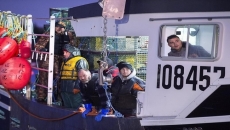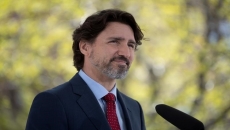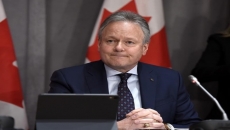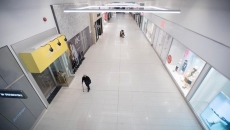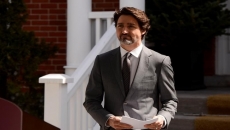Medical experts from Toronto's SickKids Hospital say children in Ontario should be able to return to school in September, even though the novel coronavirus that causes COVID-19 likely won't be eradicated by then.
The experts say that according to recent data, children are not the super-spreaders of COVID-19 they initially believed they would be.
"We know from the flu and from many other respiratory viruses that a child often acts as the super-spreader, and that is something that we really have not seen (with COVID)," Dr. Ronald Cohn, President and CEO of SickKids, said in a webinar Wednesday.
"None of the studies are suggesting that children do not transmit it at all. It's just not at the high frequency that any of us would have expected."
Dr. Jeremy Friedman, associate pediatrician-in-chief at SickKids, said 5,000 symptomatic children were tested with the COVID nasal swab at the hospital since March and only 30 were found positive. The hospital also tested 1,500 asymptomatic children with a nasal swab and found zero positive cases.
COVID-19 causes a "less severe presentation in children," said Friedman, with only seven cases requiring hospitalization at SickKids, and none needing ICU admission.
SickKids says it has worked closely with Ontario's Ministry of Education to provide guidance on how to safely reopen schools in the fall.
The recommendations were released by a team of doctors Wednesday, with Cohn saying the Ministry of Education has "reacted towards (the) document in a very positive way."
Ontario's Education Minister Stephen Lecce said in an emailed statement that the province is working closely with "the best medical and scientific leaders in Canada – including the Hospital For Sick Children and the COVID-19 Command Table" to come up with safety measures for schools.
"We will take a cautious approach that underscores our complete commitment to safety," he said. "We also appreciate the advice from the Hospital For Sick Children related to the importance of robust mental health supports, to ensure this transition is positive.
"We will ensure those supports are in place. We will continue to seek the guidance of these medical and scientific leaders to reduce risk and maximize safe learning for all children."
Hand hygiene and making sure sick children aren't going to school were among the top recommendations offered by the SickKids team.
Dr. Michelle Science says that while steps should be taken to ensure some physical distancing in schools — such as separating desks, eliminating assemblies and putting students into "cohorts" — trying to enforce safe distances among kids is impractical.
She also said playing and socializing at a close distance is "really central to child development and should not be discouraged."
While face masks have become more commonplace among the general public in recent weeks, the SickKids team doesn't require children use them in classrooms.
Science said masks are only "potentially beneficial" when worn properly and incorrect use can lead to an increased risk of infection. If students want to wear face masks, Science said "we certainly wouldn't discourage that," however.
"Of course we need to continue to monitor the situation and re-evaluate as we get evidence and learn from other countries," she added. "But I would highlight that several European countries have had children successfully return to school without face masks."
The document suggests parents be responsible for screening children each morning instead of school staff to avoid lineups and staggered start times for classes.
The experts don't recommend on-site temperature taking because "fever is not a consistent (COVID) symptom in children."
Cohn said a positive COVID test from either a student or a teacher in a school would need to be dealt with on a case-by-case basis, but the goal would not be to immediately shut down the school.
"We would expect ... that public health works closely together with the school to go through a contact tracing and testing strategy that would identify the people that are in higher risk who have been in closer contact with either the child and or adult staff member," he said.
"You would then be able to identify how much restrictions you need to put in place in order to manage that positive case."
Closing a school would also disrupt structure and routine that children need and have already been missing for the last three months, said SickKids psychiatrist Dr. Daphne Korczak.
"Those up-and-down waves of hope and disappointment (take) a significant toll on children and their families," said Korczak, who's also leading a study that is examining the mental health of children, youth and families during COVID-19.
Mitigating risk for students who are immunocompromised or have pre-existing conditions that could make them more susceptible to a severe COVID outcome should also be taken into consideration, the experts say. Friedman said that could mean offering a virtual learning option for those students.
"We would strongly encourage the schools to try and create a situation where that opportunity (for a safe learning environment) is available for all children right across the board," he added.
And if parents or guardians of kids are immunocompromised, Friedman says additional precautions may need to be taken to allow the child to still go to school.
Environmental cleaning and ventilation, even suggesting taking classes outdoors when possible, are some of the other recommendations listed in the SickKids document.
Cohn said we have to "accept and internalize that this virus will stay with us for a very long time — a year, maybe even longer."
And while we can't eliminate risk, he said we can minimize it.
"The impact on the mental, behavioural and developmental health of children not going to school, not being exposed to in-person teaching and not being with their friends and peers is something that myself and many of my colleagues in pediatrics are literally losing sleep over," Cohn said.
"It is difficult to capture this in numbers and data but ... we are significantly underestimating the impact this has on children of all socio-economic classes, particularly ones who are coming from vulnerable living and family conditions."


